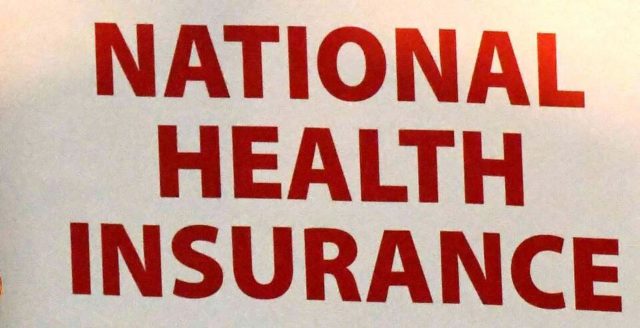‘The implementation of NHI will mean that the state can decide what treatment you require, who must provide it and where you must receive it.’
CITY residents turned out in their numbers for AfriForum’s community meeting regarding the National Health Insurance (NHI) Bill.
The civil rights organisation encouraged members of the community during the event to attend the public hearing regarding NHI to comment on the bill.
During yesterday’s meeting AfriForum also provided more clarity regarding what it termed “the derogatory impact which the implementation of the NHI Bill may have”.
“Zweli Mkhize, Minister of Health, wants to press ahead with NHI. However, it is still a mystery to AfriForum why any modern government wants to copy such a universally failed system. The implementation of NHI will mean that the state can decide what treatment you require, who must provide it and where you must receive it.
“Practical implications of this can include that the state for example can decide who must be a woman’s gynaecologist, as well as where and by which method her child must be born or what cancer treatment a patient must undergo. We cannot allow the ANC to communise the country’s health system,” Natasha Venter, AfriForum’s spokesperson for NHI, said.
Commentary
“AfriForum wants to encourage the public to oppose NHI in every possible way. This includes the online submission of commentary, as well as to give AfriForum a mandate to oppose the bill on behalf of the community.
“However, we want to emphasise that it is important that the community of Kimberley and surrounding areas attend the public hearing to offer resistance against NHI. It is the community’s chance to show their protest against NHI,” said Lize-Mari Smit, AfriForum’s district co-ordinator for the Karoo.
The trade union, Solidarity, meanwhile presented its report on the knowledge, insight and opinion of health professionals in South Africa regarding the proposed NHI.
This report covers the research done by the Solidarity Research Institute (SRI) as a follow-up investigation in October 2019. The first study was undertaken in July 2018 to gauge health care workers’ opinions and knowledge of the NHI, and their capacity to accommodate the NHI.
Nicolien Welthagen, a research psychologist at the SRI, explained: “The 2018 study included only members of Solidarity, but in 2019 questionnaires were sent to healthcare practitioners in the private as well as the public sector across the country.”
The report highlights healthcare practitioners’ concerns on the proposed NHI. “The findings indicate that there is distrust towards the government regarding the way it wants to implement and manage the NHI. Eighty percent of respondents are negative or sceptical about the NHI,” Welthagen said.
According to the results of this report, the respondents do not believe that the NHI will succeed in improving the health care system and service delivery. Only 15% of respondents believe that it would be possible to successfully implement the NHI, and 84,5% are of the view that the implementation of the NHI could destabilise the health care system in South Africa and could harm the high-quality service already being provided by the private sector.
The report further highlights the enormous risk that the emigration of health practitioners poses to the future of health care in South Africa.
“There are serious concerns about a shortage of health care workers, the more so in view of the fact that 20.8% of the respondents indicated that they had already taken steps to emigrate, and a further 41.6% would consider emigrating when the NHI is implemented,” Welthagen said.
Solidarity also warned the government to take the feedback received from the industry seriously, since it is precisely these practitioners who will be most severely affected by this step.
“Some comments and proposals conveniently are ignored to ensure that the ideology-driven plans can be steamrollered politically. This report shows unequivocally that there is a message from the industry that the NHI cannot work and that health care practitioners are not interested in participating in a totally centralised, state-run health system.
“In an already struggling health care system and shaky economy, planning of the NHI is being dealt with in an irresponsible and ill-considered manner. Given the feedback received by the government, it is difficult to see how the government considers the public’s health or the well-being of health care practitioners to be a priority,” Welthagen stated.
According to Morne Malan, senior researcher at the SRI, all formal processes through which the bill can be fought are being investigated.
The roll-out of the much-anticipated NHI will require an additional R33 billion annually from the 2025/26 financial year.
This was revealed in the National Treasury’s adjusted estimates of the national expenditure document released at the tabling of the 2019 Medium Term Budget Policy Statement (MTBPS) yesterday. This would be in addition to the previous estimations contained in the Green and White Papers of 2011 and 2017 respectively, of R74 billion a year.
“Following the introduction of the National Health Insurance Bill in Parliament earlier this year, the Department of Health reprioritised funds within its 2019/20 budget to establish an NHI office. Over the medium term, this office will receive increasing allocations for its operational costs,” it said.








